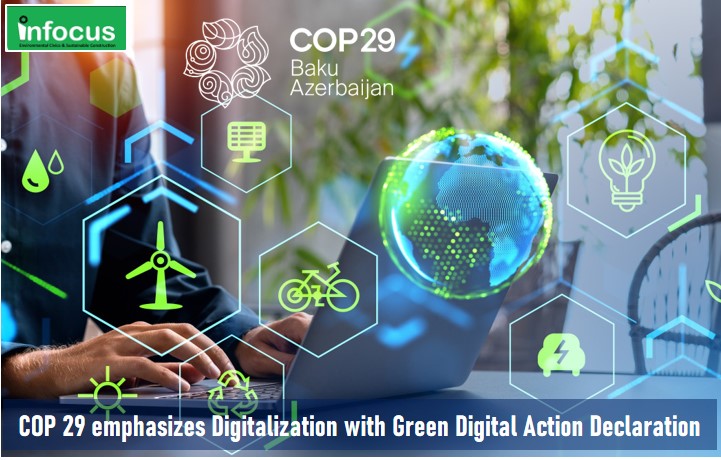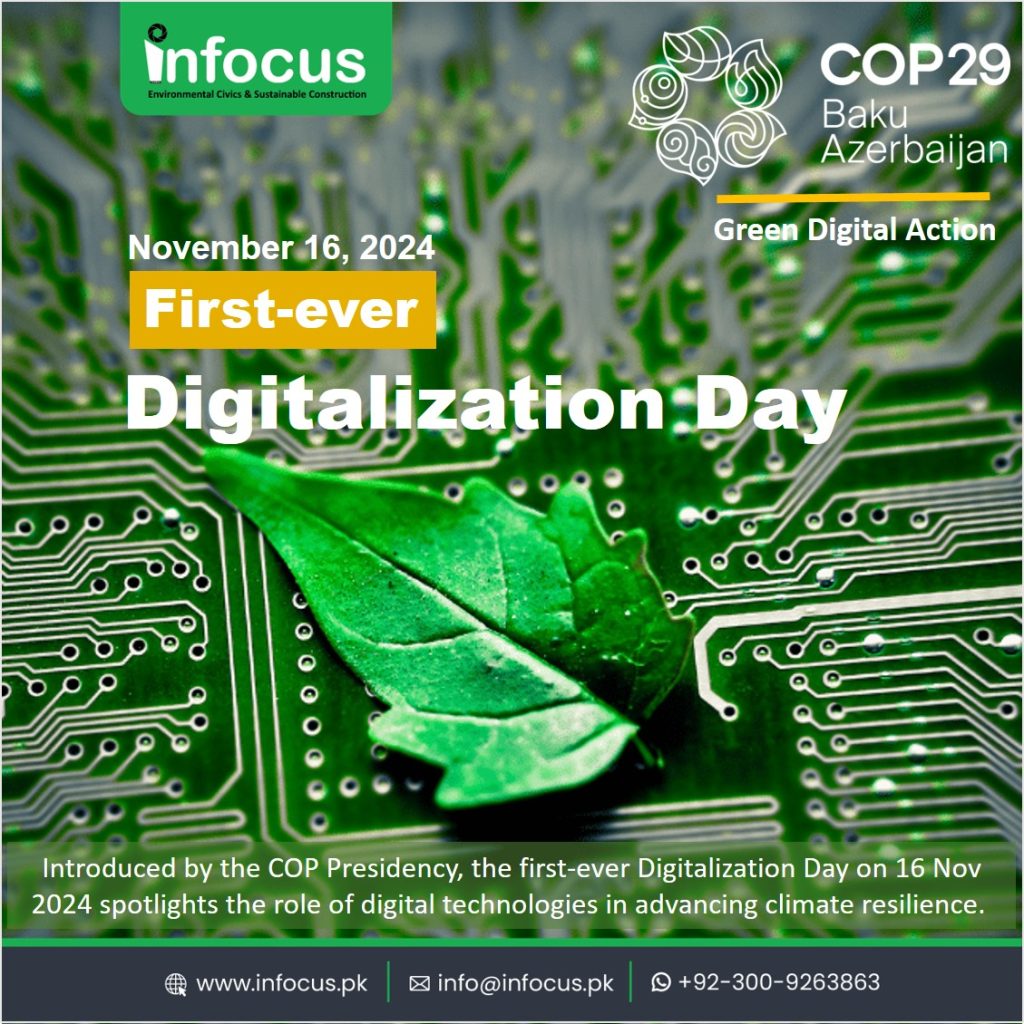Last year at the 28th Conference of the Parties (COP28) in Dubai, tech companies and governments pledged to increase their actions to address the climate crisis through the Green Digital Action (GDA) track. Led by the International Telecommunication Union (ITU), this initiative aims to unite the digital technology sector in accelerating collective efforts to tackle climate change. At COP 29 in Baku, following the initiative a high-level opening session of Green Digital Action track was held on 14 November to strengthen collaboration on sustainability within the digital technologies industry. The session features a series of green measures to rally the technology industry, especially the Green Digital Action Declaration and introducing 16 November 2024 as the first-ever Digitalization Day spotlight the role of digital technologies in advancing climate resilience.
Green Digital Action:
At COP 29, during the session of Green Digital Action track, a number of critical topics were discussed, including integrating digital innovation into climate strategies, improving climate monitoring with digital tools, promoting digital inclusion and reducing the environmental impact of digital technologies. The Green Digital Action track focuses on fostering wider partnerships, securing new commitments, and engaging global leaders to advance the use of sustainable technology and build climate resilience.
First-ever World Digitalization Day:
This year, for the first time in the history, the COP Presidency recognized the importance of digitalization in the climate talks and announced the Digitalization Day. Therefore, apart from the regular GDA sessions, our agenda includes the High-Level Roundtable on “Digital Action Path 4 Green World”, that will take place on 16 November 2024, Baku – at the Digitalization Day. It will explore how digital technologies can transform climate action.
Green Digital Action Declaration:
The roundtable session concludes with the adoption of the first Declaration, which aims to accelerate climate-positive digitalization and emission reductions in the Information and Communication Technology sector and enhance accessibility of green digital technologies.
“The Green Digital Action initiative is setting a powerful example of how the industry can lead the green transition and strengthen climate resilience. The Declaration on Green Digital Action, shows us the way forward. What we need is climate-conscious digitalization driven by purpose and shared responsibility, now”. The salient features of the Green Digital Action Declaration are;
- Recognizing the imperative to mitigate and adapt to climate change and underscoring the important role of digital technologies in achieving these objectives, the objective of the United Nations Framework Convention on Climate Change (UNFCCC) and the goals of the Paris Agreement, the 2030 Agenda for Sustainable Development and the Pact of the Future;
- Highlighting that digital innovationscan have enabling and systemic effects in reducing GHG emissions across various economic sectors and adapting to climate change impacts when properly used and governed;
- Noting with concern the adverse climate impactsassociated with the full life cycle of digital technologies and related tools, devices and infrastructures, including with regard to the energy and water consumption of the digital sector, notably in the case of data processing centers, artificial intelligence development and deployment, coupled with the carbon footprint and pollution of producing digital tools and devices, as well as the unsustainable disposal of obsolete digital infrastructure, that need to be addressed;
- Acknowledging that more consistent, technically rigorous and comprehensive data on GHG emissions and energy consumption from the Information and Communication Technology (ICT) sector can significantly enhance our progress towards accurately assessing its climate impacts and setting more effective climate targets;
- Underlining the various digital divides as substantial impediments to achieving equitable, inclusive, just and digital transitions, and cognizant that disparities in digital access, capacities and resources can deepen inequalities and obstruct global climate efforts;
- Expressing deep concern about the potential effects that disinformation and misinformation may have on the credibility of scientific knowledge and on the global perception of the causes and potential impacts of climate change, as well as on public awareness, mobilization and collective action to prevent and combat these impacts;
- Reaffirming the imperative to address these disparities to fully leverage digitalization for global sustainability, ensuring that all benefit from a meaningfully connected world while leaving no one behind, including Indigenous Peoples, local communities, women, children, youth, and persons with disabilities;
- Emphasizing the importance of stronger collaboration between governments, the private sector, academia, technical communities, civil society and other stakeholders – in conformity with their roles and responsibilities, as well as synergy building among international organizations, and collective action and strengthened partnerships as a way to leverage digitalization for climate action effectively;
By
Editorial, Infocus



